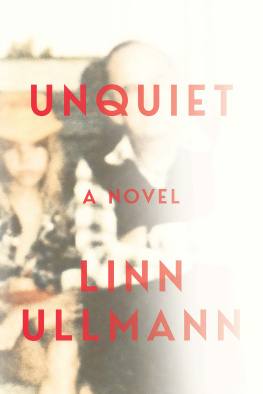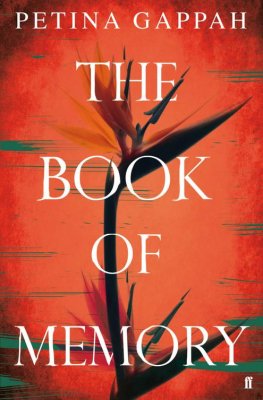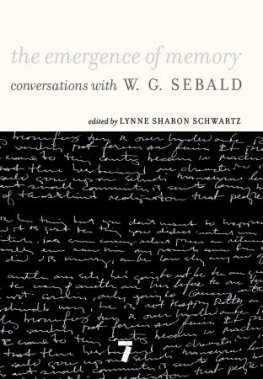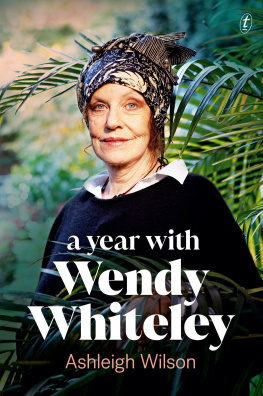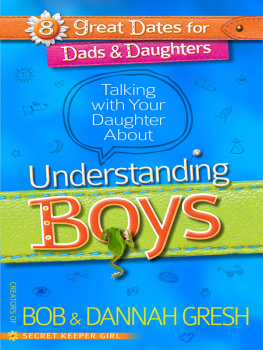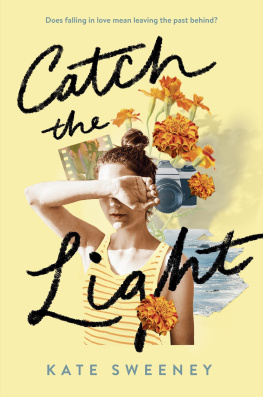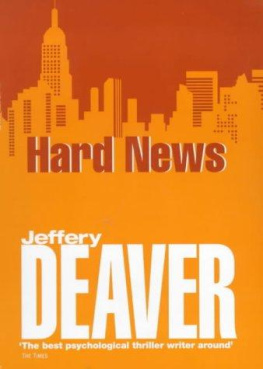Contents
Guide

ALSO BY
LINN ULLMANN
THE COLD SONG
A BLESSED CHILD
GRACE
STELLA DESCENDING
BEFORE YOU SLEEP
UNQUIET

A NOVEL
LINN
ULLMANN
TRANSLATED FROM THE NORWEGIAN BY
THILO REINHARD

Copyright 2015 by Forlaget Oktober AS, Oslo
Translation copyright 2019 by Linn Ullmann
This translation has been published with the financial support of NORLA.
Translated by Thilo Reinhard
Originally published in Norwegian as De Urolige
All rights reserved
For information about permission to reproduce selections from this book, write to Permissions, W. W. Norton & Company, Inc.,
500 Fifth Avenue, New York, NY 10110
For information about special discounts for bulk purchases, please contact
W. W. Norton Special Sales at specialsales@wwnorton.com or 800-233-4830
Book design by Barbara Bachman
Production manager: Julia Druskin
ISBN 978-0-393-60994-3
ISBN 978-0-393-60995-0 (ebk.)
W. W. Norton & Company, Inc., 500 Fifth Avenue, New York, N.Y. 10110
www.wwnorton.com
W. W. Norton & Company Ltd., 15 Carlisle Street, London W1D 3BS
For Hanna
I
HAMMARS PRELUDE
A map of the island
...
The only maps and charts
he had to go by
were remembered or imaginary
but these were clear enough.
JOHN CHEEVER , The Swimmer
T O SEE, TO REMEMBER, TO COMPREHEND. It all depends on where you stand. The first time I came to Hammars I was barely a year old and knew nothing of the great and upheaving love that had brought me there.
Actually, there were three loves.
If there were such a thing as a telescope that could be trained on the past, I could have said: Look, thats us, lets find out what really happened. And every time we began to doubt whether what I remember is true or what you remember is true or whether what happened really happened, or whether we even existed, we could have stood side by side and looked into the telescope together.
I organize, catalogue, and number. I say: There were three loves. I am the same age now that my father was when I was born. Forty-eight. My mother was twenty-seven, she looked both much younger and much older than her years back then.
I dont know which of the three loves came first. But Ill begin with the one that arose between my mother and father in 1965 and ended before I was old enough to remember anything about it.
I have seen pictures and read letters and heard them talk about their time together and heard other people talk about it, but the truth is you can never know much about other peoples lives, least of all your parents, and certainly not if your parents have made a point of turning their lives into stories that they then go on to tell with a God-given ability for not caring the least about whats true and whats not.
The second love is an extension of the first and concerns the lovers who became parents and the girl who was their daughter. I loved my mother and father unconditionally, I took them for granted in the same way that, for a while, one takes the seasons for granted, or the months or the hours, one was night and the other was day, one ended where the other began, I was her child and his child, but considering that they, too, wanted to be children, things sometimes got a little difficult. And then theres this: I was his child and her child, but not their child, it was never us three; when I browse through the pictures lying spread out on my desk, there isnt a single photograph of the three of us together. She and he and I.
That constellation doesnt exist.
I wanted to grow up as quickly as possible, I didnt like being a child, I was afraid of other children, their inventiveness, their unpredictability, their games, and to make up for my own childishness, I used to imagine that I could split myself and become many, turn myself into a Lilliputian army, and that there was strength in us we were small, but we were many. I split myself and marched from one to the other, from father to mother and from mother to father, I had many eyes and many ears, many skinny bodies, many high-pitched voices and several choreographies.

The third love. A place. Hammars, or Djaupadal as it was known in the old days. Hammars was his place, not hers, not the other womens, not the childrens, not the grandchildrens. For a time it felt as if we belonged there, as if it were our place. If its true that everyone has one place, although I suppose it isnt, but if it were true, then this was my place, or at least more mine than the name I was given; it didnt feel uncomfortable to wander around Hammars the way it feels uncomfortable to wander around inside my own name. I recognized the smell of the air and the sea and the stones and the way the pine trees hunched in the wind.
To name. To give and take and have and live and die with a name. One day I would like to write a book without names. Or a book with lots of names. Or a book in which all the names are so ordinary that they are immediately forgotten, or sound so alike that its impossible to tell them apart. My parents (after much back and forth) gave me a name, but I never liked that name. I dont recognize myself in it. When someone calls my name, I duck as if Ive forgotten to put on clothes and only realize it once Im outside with people all around me.
In the autumn of 2006 something happened that Ive since come to think of as a darkening, an eclipse.
The astronomer Aglaonike, or Aganice of Thessaly as she is also known, lived long before the age of the telescope, but could, with her naked eye, predict the precise time and place of lunar eclipses.
I can draw down the moon , she said.
She knew where to go and where to stand, she knew what would happen and when. She reached for the sky and the sky turned black.
In Advice to Bride and Groom, Plutarch cautions his readers against women like Aglaonike, calling them sorceresses, and instructs new brides to read, learn, and keep abreast. A woman who masters geometry, he argues, will not be tempted to dance. A well-read woman will not be lured into folly. A sensible woman schooled in astronomy will laugh out loud if another woman tries telling her its possible to draw down the moon.
No one knows exactly when Aglaonike lived. What we do know, and what even Plutarch acknowledged, never mind the condescending comments he made about her, was that she was able to predict the exact time and place of lunar eclipses.
I remember exactly where I stood, but lacked the ability to predict anything at all. My father was a punctual man. When I was a child, he opened the case of the grandfather clock in the living room and showed me its mechanics. The pendulum. The brass weights. He expected punctuality of himself and of everyone else.
In the autumn of 2006 he had less than a year left to live, but I didnt know that then. Nor did he. I stood outside the white limestone barn with the rust-red door and waited for him. The barn had been converted into a cinema and was surrounded by fields, stone walls, and a few scattered houses. A bit farther off lay Dmba Marsh with its abundant birdlifegreat bitterns, cranes, herons, sandpipers.

